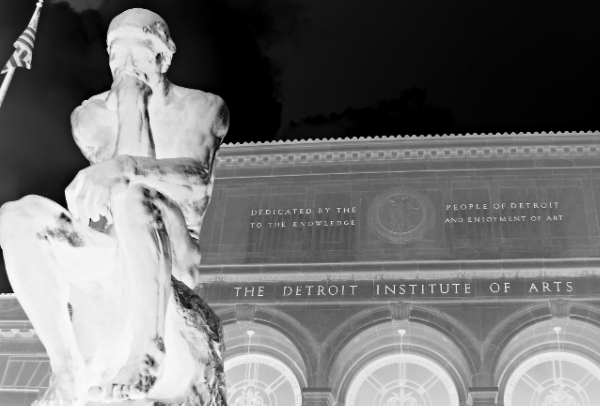This is unreal

[DIA “Thinker” image modified from CC photo by Michael Barera | Wikimedia Commons]
“This is unprecedented in my experience,” he said. “It seems reckless to even consider liquidating these public assets.”
That’s Maxwell Anderson, director of the Dallas Museum of Art, one of the country’s most highly regarded museum directors talking about the sale of the Detroit Institute of Arts’ priceless art collection. Despite the fact that many people thought even contemplating liquidating their collection to pay Detroit’s creditors, many of whom are banks, the opposite is actually true:
Employees of Christie’s International PLC auction house visited the museum in anticipation of being hired to do an appraisal, said a staffer familiar with the trip who wasn’t authorized to speak for attribution.“Christie’s called us and said they’re sending two people,” said Pamela Marcil, a museum spokeswoman. “We don’t know who contacted Christie’s.”
While some art collectors seem more concerned about the move depressing art prices as a glut of new masterpieces come on the market, those of us here in Michigan have a bigger worry: the loss of a publicly-held treasure, held in trust by the city of Detroit for all the citizens of Michigan.
When you attend the DIA (and I, as a member do several times a year), many of the tags next to the works of art tell you who donated the piece. Much of the collection was donated by wealthy art lovers and philanthropists who did it as a benevolence.
Imagine what the impact will be on the DIA’s ability — or ANY municipal museum’s ability, for that matter — to receive these types of donations in the future if they might one day be sold off to pay off banks and insurance companies. You can pretty much say goodbye to the DIA remaining as one of the top ten museums in the country due to the expansive collection.
When you think about it, it would be just one more disinvestment in the city of Detroit, one more in a very large number that has brought the city to where it is today.



